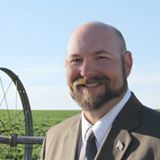
A political newcomer is challenging a retired school superintendent in the race for the Republican nomination for one of the two House seats in Western Idaho’s District 9.
The primary pits Jake Stephens of Caldwell, who works in the transportation and freight industries, against Rep. Ryan Kerby, R-New Plymouth.
Kerby served as superintendent of the New Plymouth School District for 21 years and holds a seat on the House Education Committee.
Kerby believes one of the top issues facing his constituents is oil and gas exploration. On the education front, Kerby supports the expansion of dual credit and advanced opportunities programs. He also backed a pair of literacy initiatives that were signed into law earlier this year.

“We did a good job with the reading initiative,” Kerby said. “It was a nice move to get more kids reading up to grade level in Idaho.”
Stephens supports restoring the timber and mining industries, and believes doing so will jumpstart the economy and make more funding available for education.
“When you spend more money, our kids don’t come out smarter and it doesn’t bring more to the area for jobs,” Stephens said. “Until we change the system dramatically we aren’t going to see a difference.”
The winner of the May 17 GOP primary will advance to face Weiser Democrat Rejeana A. Goolsby in November’s general election.
The race
Republican Primary: District 9, House Seat A
Candidates:
Incumbent Rep. Ryan Kerby
Challenger Jake Stephens
How long have you lived in your legislative district?
Kerby: 35 years, Idaho native.
Stephens: 16 years, Idaho native.
Education:
Kerby: Master’s of Education, College of Idaho. Education Specialist, University of Idaho.
Stephens: Graduate of Kuna High School.
Political background:
Kerby: Served one two-year term in the House. First elected 2014. Ran unsuccessfully for superintendent of public instruction in 1998.
Stephens: Political newcomer.
Who can vote: Registered voters within Legislative District 9, which includes portions of Adams, Payette, Washington and Canyon counties. Click this map for district boundaries.
Primary Election date: May 17
Education connection: Kerby is a retired superintendent who sits on the House Education Committee.
Before you vote: Double check whether you are registered to vote and the location of your polling place.
Candidates’ questionnaire responses
Do you support the 2016-17 public school budget passed by the Legislature this year? Why or why not?
Kerby: “I support it. I thought it was a good budget. We did the career ladder (salary law), which was the second year of the five-year plan. We got operations funding up to 2009 levels — that was a nice job by the Legislature to get back there in three years when the original plan was five. We did a good job with the reading initiative. It was a nice move to get more kids reading up to grade level in Idaho. I also like the career counseling piece that we did. That will really help get more kids to understand the different pathways while in high school.”
Stephens: “It doesn’t matter the amount of money that is spent on schools. It will never be enough to anybody. There is always somebody saying it’s too much, and always somebody saying it’s not enough. It doesn’t matter how much we put into schools unless it gets to the right places and we remove government red tape and bureaucracy and the other levels of government oversight that take money away from teachers and kids. We’re not fixing the education system. We continue to do the same thing over and over again and we’re creating a status quo that doesn’t work.”
Explain why you support or oppose implementing all of Gov. Butch Otter’s Task Force for Improving Education recommendations over the next three years.
Kerby: “I think we’ve already put most of them in place. I don’t think there are many left. To my knowledge, what else is there is to do? I certainly hope we can finish out the five-year plan of the career ladder (salary law). That will really help Idaho attract and retain good, quality teachers. We were at a crisis level when we started that, as far as school districts not finding teachers in certain fields. It takes a few years, and that is really helping. It is real important to finish that out.”
Stephens: “Forgive me if I find this somewhat funny — creating a task force to spend money to figure out how we can implement programs to change kids. Then we turn around and say ‘You can’t have the money, but here are the changes we should make.’ So I laugh at that. You know, our teachers know exactly what needs to go on. They know where the money needs to go. We don’t need a bunch of legislators telling us or telling our teacher how they can spend the money and where it need to be spent.”
State leaders are promoting a goal of having 60 percent of the Idaho’s young adults hold a postsecondary degree or certificate by the year 2020. Do you support or oppose this goal, and why?
Kerby: “I think it great goal. But it is going to be pretty tough to make it by 2020. We are doing a lot of thing to get more kids to go on (with their education). We will hit it sooner than we would have if we hadn’t done those things. For 2020, we may have hurt ourselves when we didn’t fund the governor’s scholarship proposal for adults.
I think it’s a worthy goal. Really by 2025 it probably needs to be 75 percent. Hopefully by 2025 we’re closer to that number.”
Stephens: “Trades are where the money is at, there is no question about that. Whether that be electrical, plumbing, carpentry, whatever it may be, we need to get that into schools. This will never happen because of insurance and all that, but I wonder why kids aren’t cutting the grass and changing light bulbs and taking care of their school to learn things they need to learn.
Right now, we’re all pushing kids to get desk jobs. Unless we bring back hard work and bring back that feeling of a good hard days work, only a small percentage are going to be successful.”
Idaho students math scores on several tests, including the SAT, SBAC and NAEP, have raised concerns among educators and state leaders. What would you do to increase student achievement in math?
Kerby: “I’m not a big fan of the SAT test, it does not accurately measure math education attainment. So I think we need to move to the ACT, and then I would be a lot more interested in trying to improve our schools. NAEP goes up and down from year to year. I think what we need is the ACT test, which is an actual measure of educational attainment, which the SAT is not. Then we can start setting some goals and trying to increase our scores. We need to get the ISAT (SBAC) figured out, what we are doing long-term.”
Stephens: “I’m not a teacher. I enjoy math. I’ve always enjoyed math. It is an important part of the education system. But it’s not my position to stand up and say ‘We need to change math or this subject.’ I’m not an educator. I have no business standing up telling our teachers or our parents what to do. That’s not my profession. I wouldn’t call an electrician in to do a plumber’s job.”
Further reading:
- Check Kerby’s voting record on education issues by scrolling through Idaho Ed News’ bill tracker.
- April 4 Idaho Ed News’ campaign coverage kickoff article.
- April 11: District 4, House Seat A, Macomber vs. Malek.
